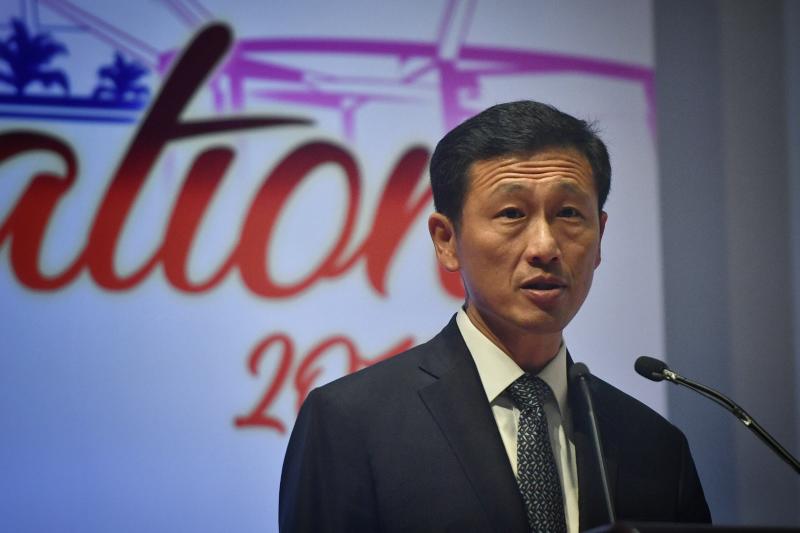Higher chances of polytechnic admission for some under new changes
Sign up now: Get tips on how to help your child succeed

Education Minister Ong Ye Kung said the Early Admissions Exercise for polytechnics will be expanded this year to include working adults.
ST PHOTO: ARIFFIN JAMAR
SINGAPORE - Those seeking entry into polytechnics may soon find it easier to gain admission, and poly students will have more options after graduation, Education Minister Ong Ye Kung said on Friday (May 3).
Speaking at Temasek Polytechnic's (TP) first graduation ceremony for this year, Mr Ong said the Early Admissions Exercise (EAE) for polys will be expanded this year to include working adults.
The EAE is an aptitude-based admission exercise that allows students to apply for poly courses and receive conditional offers for admission before receiving their final grades.
"In processing the applications (for working adults), polytechnics will evaluate their current and relevant work experience, putting less emphasis on academic results attained at a young age. We hope that this will open a new door for working adults to upgrade," said Mr Ong.
The Polytechnic Foundation Programme (PFP), a one-year programme that allows Normal (Academic) students to bypass the O levels and enrol in a diploma course, is also increasing enrolment to take in the top 15 per cent of the cohort, up from 10 per cent.
About 1,600 students applied for the PFP this year, up from about 1,250 last year.
Mr Ong said the performance of the students in the PFP has been encouraging, with over 35 per cent of the first cohort in 2017 scoring a grade point average (GPA) of 3.5 and above. In comparison, out of the entire graduating cohort, only 25 per cent achieved that result.
The minister also said that the post-secondary school posting system will be reviewed and streamlined, in the light of the announcement earlier this year that streaming in secondary school will be replaced by full subject-based banding by 2024.
Citing admission exercises such as the Direct School Admission, Joint Admission Exercise and Joint Polytechnic Admission Exercise, Mr Ong said: "The exercise which a student is eligible for is very much determined by his secondary school stream and performance within the stream."
The system will be reviewed "with a view to streamlining admissions and injecting more flexibility, recognising all-rounders as well as students with specific talents and strengths", he added.
Pathways for poly students after graduation have also opened up. The newer autonomous universities - such as the Singapore Institute of Technology and the Singapore University of Social Sciences - are taking in significant numbers of poly graduates.
Across the six autonomous universities, more than one-third of undergraduates are poly graduates, said Mr Ong.
But he also encouraged poly students to consider working a few years before pursuing further studies, especially for those in fields such as nursing or early childhood education where "the industry values work experience, and a university education is far more useful after accumulating some years at the workplace".
"When working adults of my age look back, we conclude that the most important skills we use today are learnt in the job rather than in school. That is a fact, but... the preference is still to go for further studies rather than work, because many employers still hire based on academic qualifications," he said.
"This is however changing, as more employers are now looking beyond academic grades," he said, citing other yardsticks of merit, such as character, interests and passion.
His comments followed the news in February that the National University of Singapore (NUS) will take in more poly graduates with entrepreneurial abilities. It has requested each poly to nominate 40 students who have displayed a strong entrepreneurial inclination during their studies. Those who do not meet admission requirements will be considered under a special admission scheme.
From 2020, NUS and Nanyang Technological University will also drop the current 20 per cent weighting given to O-level results for poly graduate applicants, in a move to recognise their poly qualification and put them on a par with their peers from junior colleges. Applicants will be assessed based on their GPA in poly.
At the ceremony on Friday, graduates of TP's Diploma in Early Childhood Studies course were among those who received their certificates.
Addressing the graduates, Mr Ong stressed: "Learning is not merely confined to what you like to do, but recognising what it takes to do your job better, and harnessing the courage to venture into something unfamiliar and uncomfortable, and master it.
"That is really the underlying attitude when we say we need to learn how to learn."
At Ngee Ann Polytechnic (NP), Minister for Communications and Information S. Iswaran also highlighted the importance of lifelong learning and upskilling.
He announced a new series of curated, bite-sized courses called Professions, available on the existing mobile app Gnowbe by the end of May. Singaporeans can use their SkillsFuture credits to pay for the courses offered, which range from data analytics to special education needs.
Addressing graduates from NP's School of Infocomm and Technology, and Continuing Education Academy, Mr Iswaran said: "Technology is constantly disrupting industries, business models and jobs... To stay relevant and competitive, our enterprises must keep enhancing their capabilities; our people must keep upgrading their skills and gain new knowledge."
Meanwhile, at Nanyang Polytechnic's graduation ceremony for Chemical and Life Sciences students, Minister for Trade and Industry Chan Chun Sing reminded students to pay forward the opportunities given to them by their parents.
"Your job is to make sure that in 20 years' time, you will leave behind something even better for the next generation," said Mr Chan.
"If each and every generation in Singapore can continue to do this... there is nothing to say that this little red dot of ours cannot continue to grow and glow on the world stage."


